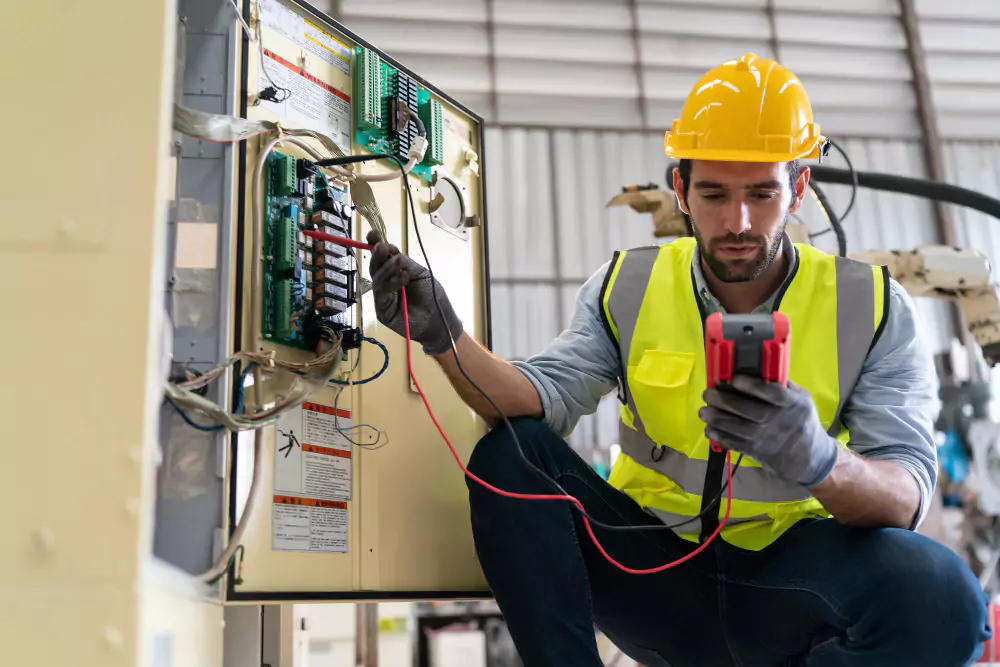
A great cover letter makes hiring managers think: “We need this person on our team.”
Here are the main points covered in this article:
- Complete cover letter examples (senior and junior levels)
- Step-by-step instructions on how to write your cover letter
- A list of common mistakes to avoid
- Pro cover letter tips to make yours stand out
- FAQs about electrical engineer cover letters

TL;DR Quick Checklist for Electrical Engineer Cover Letters
⚡ Quick Glance Example:
Before we dive into full cover letter samples, here’s a one-liner from a high-impact electrical engineer cover letter:
Why it works:
- Uses measurable results.
- Shows both technical and leadership skills.
- Delivers immediate value to the employer.
Electrical Engineer Cover Letter for a Senior Applicant
Electrical Engineer Cover Letter for a Junior Applicant
Electrical Engineer Cover Letter Example (Career Switcher)
What is a Cover Letter?
If you’re new to job applications, you might be wondering: What is a cover letter? and why it’s important.
A cover letter is a one-page document that accompanies your resume and gives hiring managers a deeper look at who you are. While your resume lists your qualifications, the cover letter explains why you’re interested in the job, how your experience connects to the role, and why you’d be a strong fit for the company.
For electrical engineers, a cover letter is especially important because it helps you show more than just technical skills. Employers also want to know about your problem-solving abilities, project achievements, and communication skills, which aren’t always obvious from a resume.
Think of your cover letter as your chance to “connect the dots” for the hiring manager and make it clear why they should call you for an interview.
How to Write an Electrical Engineer’s Cover Letter (Step-by-Step)
A cover letter is more than just a formality; it's your chance to introduce yourself to a potential employer and explain why you’re a good fit for the role. Unlike your resume, which lists facts, the cover letter tells a short story about your experience and motivation.
If you’re applying for multiple jobs, you’ll need to tailor your letter each time. That might sound like a lot of work, but once you understand the basic structure, you’ll only need to make small adjustments for each application.
Here’s a tried-and-true framework you can follow when writing an electrical engineer’s cover letter:
- Header
- Greeting
- Introduction
- Key Achievements
- How You’ll Contribute
- Call to Action
- Closing
Let’s walk through each part.
1. Start with the Header
Your header should make it easy for the hiring manager to see who you are and how to reach you. Include your name, job title, email, phone number, city, and the date. Then list the recipient’s name, company, and location.
2. Greeting
Whenever possible, address the hiring manager by name. “Dear Mr. John” or “Dear Heath” feels much more personal than “To Whom It May Concern.”
3. Introduce Yourself
Your opening paragraph should grab attention. Think of it as your elevator pitch — who you are, what you’ve done, and why you’re excited about this opportunity.
This works because it highlights both scope and impact right away.
4. Highlight Your Achievements
Once you’ve introduced yourself, add more detail about specific successes that relate to the role. Numbers and results make your contributions concrete.
5. Show How You’ll Contribute
Now shift the focus to the company. Why are you applying, and how can you help them? Look at the job posting and, if possible, research their current projects.
This shows you understand a likely pain point — staying on schedule — and positions you as someone who can address it.
6. End with a Call to Action
Close by inviting the hiring manager to take the next step. A clear, confident CTA helps move your application forward.
7. Choose a Professional Closing
End with a standard sign-off such as:
- Regards
- Kind regards
- Warm regards
- Yours sincerely
- Most sincerely
- Yours truly
- Yours faithfully
- Respectfully
Avoid casual endings like “Cheers” or “Take care” — this is still a professional document.

Example: Strong vs. Weak Intros
Mistakes to Look Upon in writing an Electrical Engineer Cover Letter
Even skilled professionals can make errors when drafting their cover letters. Here are a few traps you’ll want to steer clear of:
- Using a one-size-fits-all letter: Sending the same generic note to every company makes your application blend in. Tailor your message so it reflects the role and the organization you’re targeting.
- Repeating your resume: Instead of listing job duties again, use your cover letter to explain the impact of your work and share specific achievements.
- Leaving out results: Employers respond well to numbers. Highlight measurable outcomes such as cost savings, project delivery times, or efficiency improvements.
- Overlooking soft skills: Technical ability is crucial, but so are qualities like collaboration, clear communication, and leadership. Show that you bring both.
- Ending without direction: Avoid vague closings like “Hope to hear from you.” Instead, wrap up with a confident call to action that expresses enthusiasm for the next step.
Tips to Improve Your Electrical Engineer Cover Letter
- Be sure to carefully proofread your cover letter for spelling and grammar errors. Use Grammarly.
- Use specific examples of projects or tasks you have completed, illustrating your electrical engineering skills and experiences. Add numbers where applicable.
- Use a professional tone in your cover letter and avoid using slang or overly casual language.
- Use a modern cover letter template to create your letter.
Key Points in Writing an Electrical Engineer Cover Letter
- Begin by either creating a layout or using a premade cover letter template.
- Include a header at the top of your cover letter that includes your and the recipient's contact information.
- Use a formal greeting to address the hiring manager.
- In the first paragraph, introduce yourself and provide a brief overview of your background.
- In the second paragraph, highlight your best achievements and experiences.
- In the third paragraph, explain why you believe you are the best fit for the position.
- In the last paragraph, include a call to action. Requesting an interview.
- Close the letter with a formal closing, such as "Sincerely" or "Best regards."
Complement Your Electrical Engineering Cover Letter with a Resume
The cover letter is an important component of a job application, but the main focus should be on the resume. The purpose of the resume is to highlight your career progression, education, and skills.
To create an effective resume for an electrical engineer position, follow our complete electrical engineer resume guide. With this approach, your resume is likely to stand out from over 95% of the other resumes the hiring manager will receive.
When applying for a job, it's important to tailor your resume to the specific position. Be sure to update the experience, professional summary, and skills sections to align with the requirements of the job.
















 Don’ts
Don’ts














